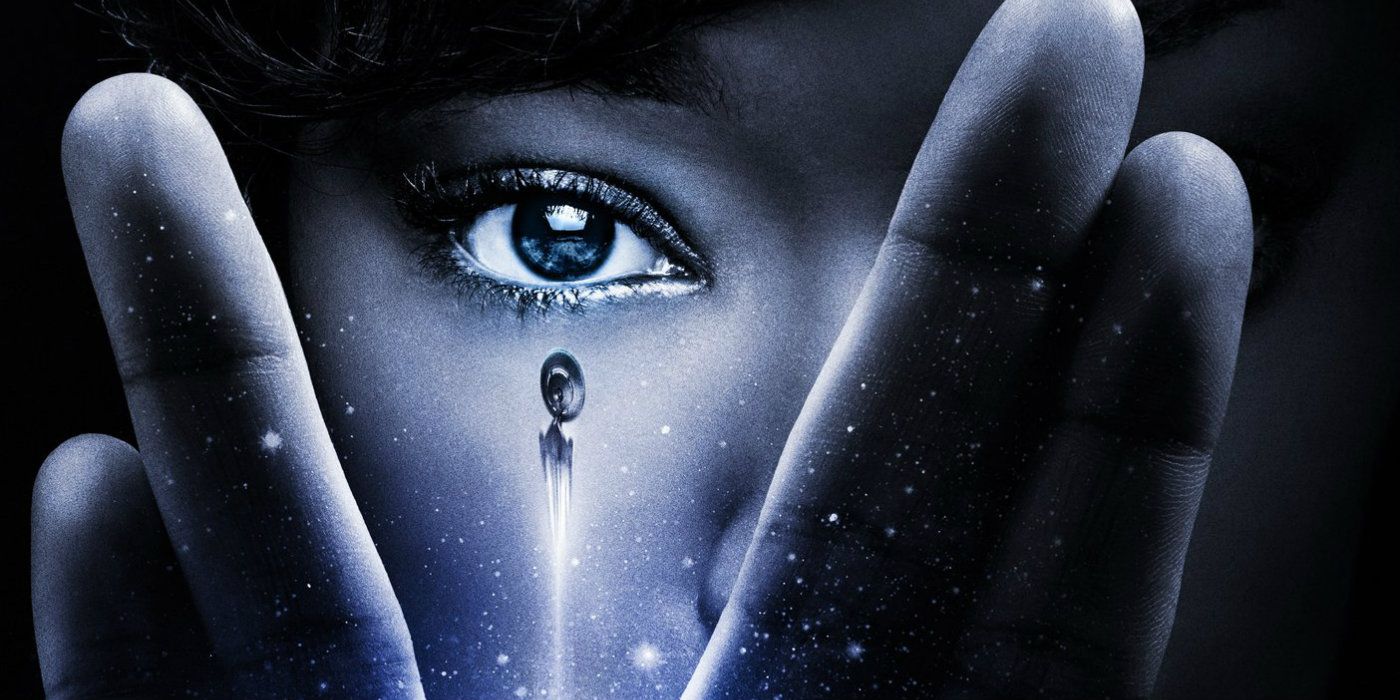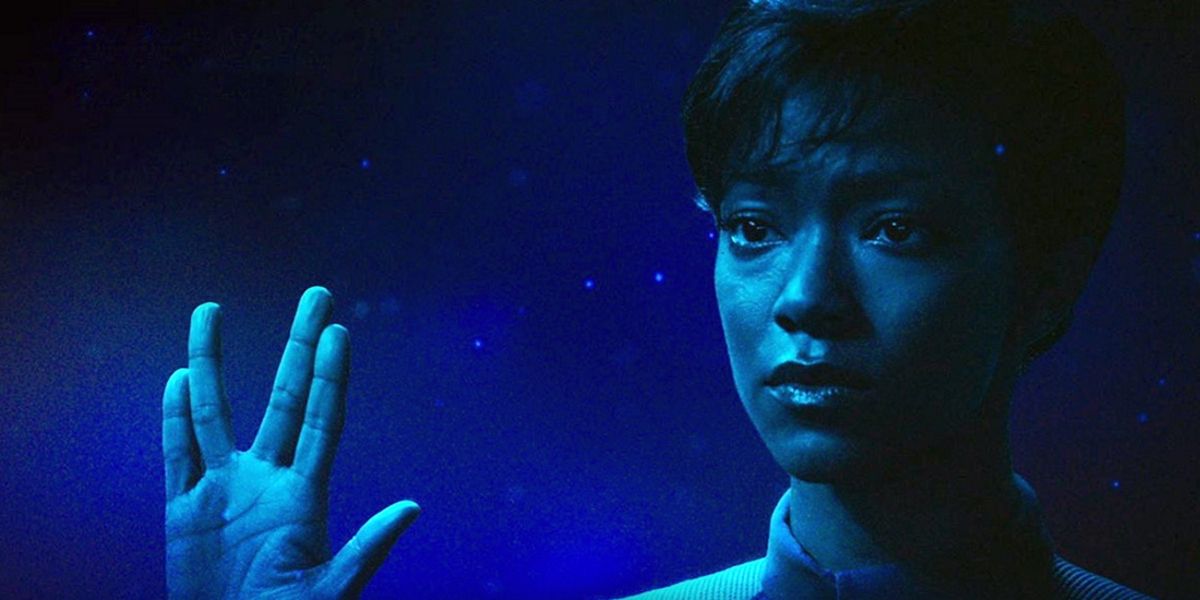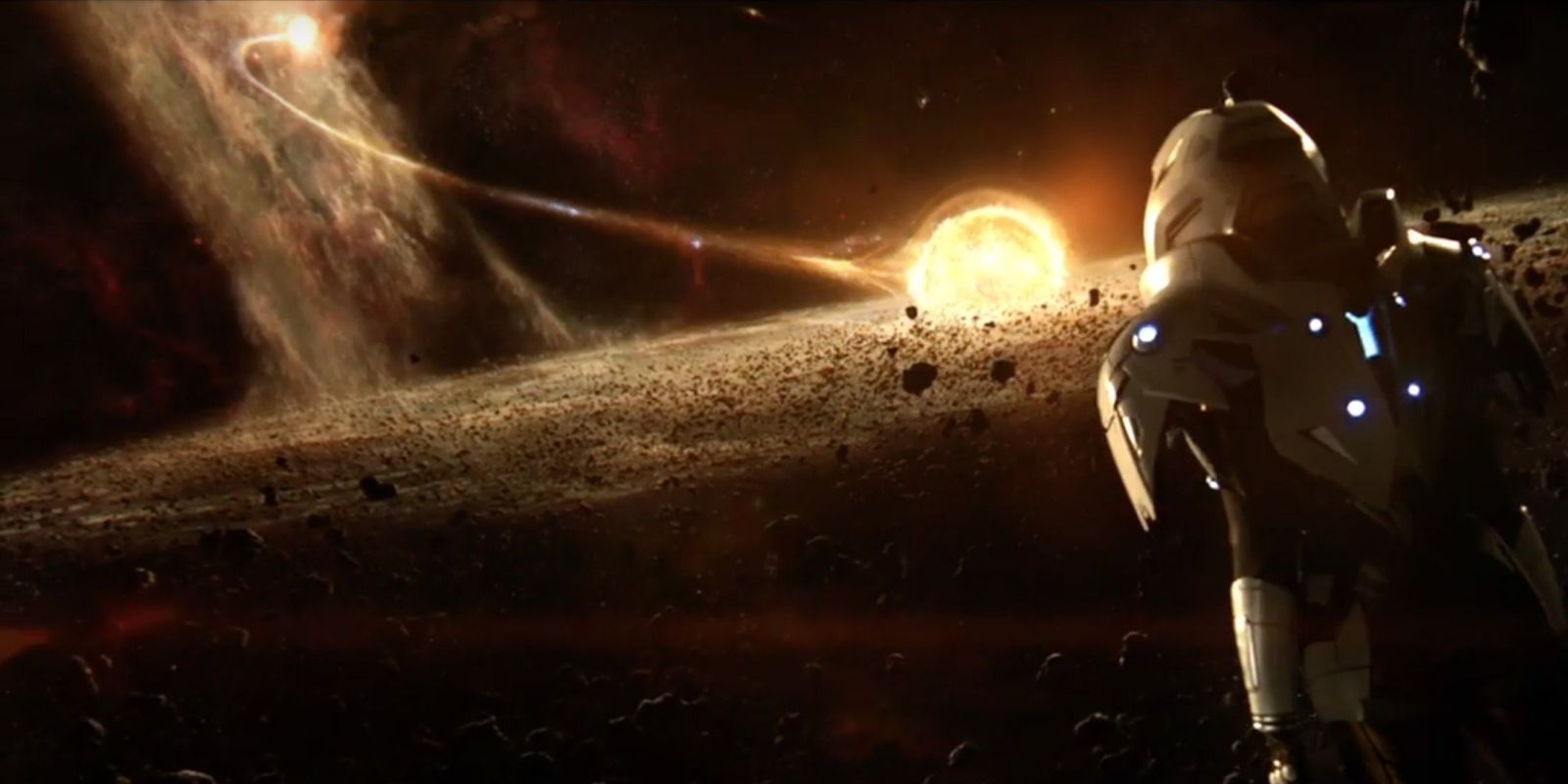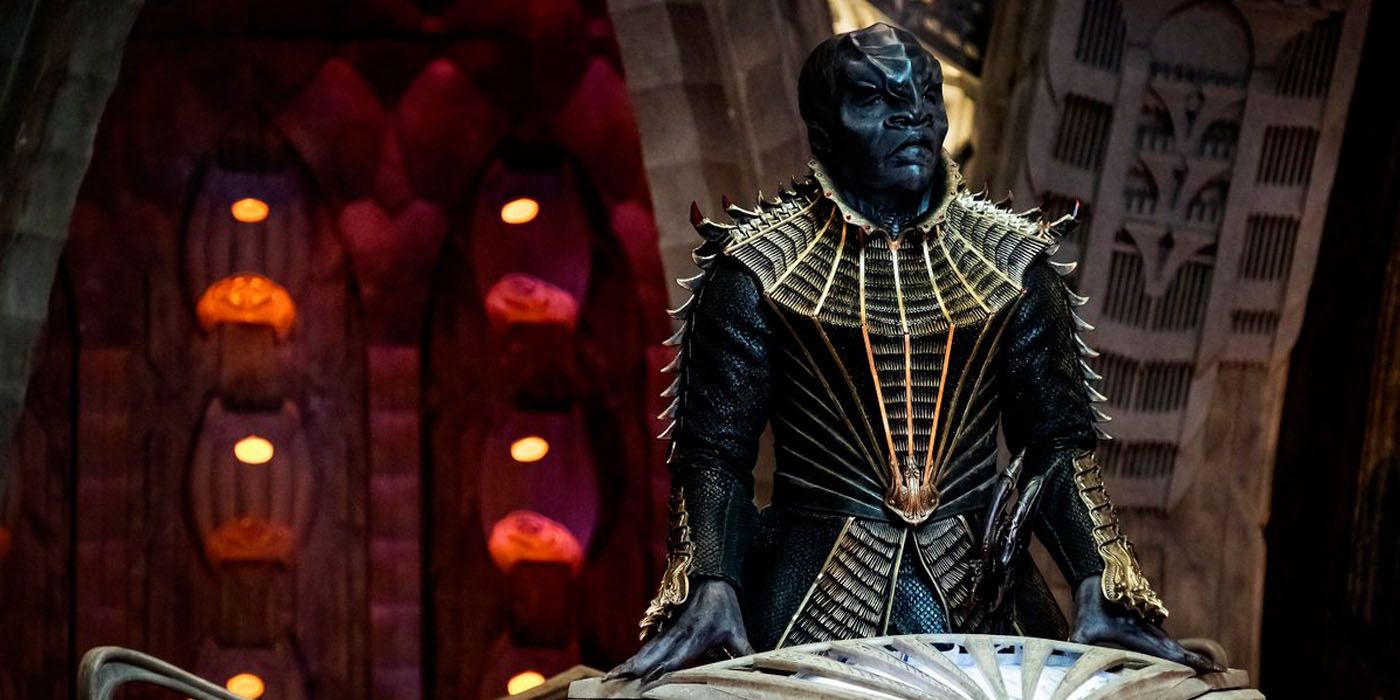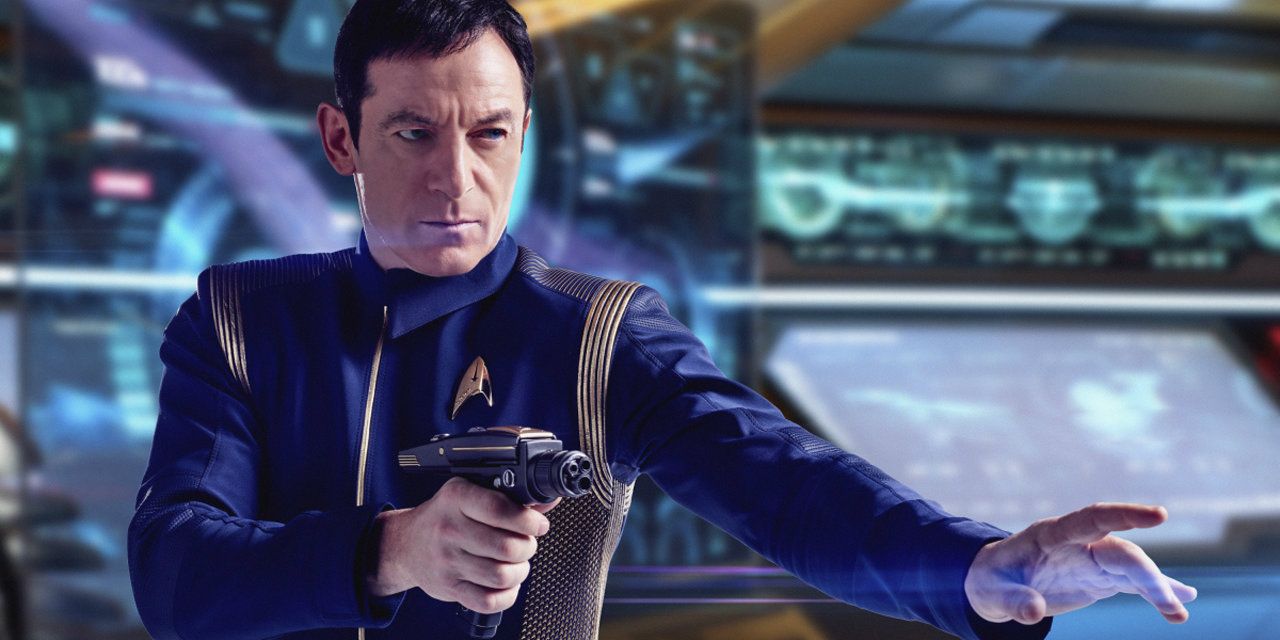Titles for episodes 1-4 of #StarTrekDiscovery have been revealed! Stream the world premiere this Sunday: https://t.co/4RMvmz6Rwi pic.twitter.com/WvQ6DLF0O2— Star Trek: Discovery (@startrekcbs) September 18, 2017
[Warning: possible SPOILERS for Star Trek: Discovery Season 1 ahead.]
–
Star Trek is renowned for its creative episode titles. For example, previous shows employed fanciful or expressive headings like The Original Series' 'The City on the Edge of Forever' or Next Generation's 'Who Watches the Watchers,' which suggested meaning and plot before the show even kicked off. The names also hint at the consequences the crew (and audience) will face before the hour is up. Star Trek: Discovery, in turn, took a page from this aspect of the franchise as well.
Less than two weeks before its premiere, the producers put together a teaser that featured the names of the first four episodes. Much like their predecessors, they carry a strong sense of purpose, teasing events contained within the 51-year-old franchise’s latest outing. So, what do these evocative titles tell us about the series as it nears its debut? We break things down the clues hidden in Discovery’s titles. Needless to say, potential spoilers ahead.
‘The Vulcan Hello’
The first episode might be the easiest to analyze, simply because fans have the most available information on it. 'The Vulcan Hello' is probably a play on the traditional cultural greeting, the ‘V’ shaped, split-fingered salute often accompanied by “live long and prosper.” (It’s kind of like Vulcan’s “aloha.”)
In any case, we know Lt. Cmdr. Michael Burnham (Sonequa Martin-Green) lost her parents during a Klingon attack on Vulcan and was adopted by Spock’s father Sarek. She’s also apparently the first human to undergo the rigors of their educational system. Unsurprisingly, the first episode should deal with her origin story, as well as set the stage for the war to come.
Related: How To Watch Star Trek: Discovery Online
Martin-Green’s character is essentially the opposite of Spock but undergoes a similar transition. She’s a human raised as a Vulcan, growing into her own humanity. Sarek is reportedly rather (dispassionately) proud of her and regularly communicates with his foster daughter. Not only that, but he’s been sculpting her career at Starfleet – which as a Vulcan statesman and ambassador, he has both a great deal of clout as well as esteem he could lose. Sarek is also the link between Discovery and its predecessors.
Interestingly enough, the producers have teased that, early in the series, Michael makes an impossible decision that changes her life and the lives of the entire Federation, even the Alpha Quadrant. Despite her profession and her dispassionate upbringing, her deep-seeded anger at the Klingons for the deaths of her parents may rise to the surface. As such, she may incite a war between the two powers. In addition, Burnham’s actions, as well as her emergent humanity, could strain her and Sarek’s relationship. After all, in theory, the Vulcan hello is also a goodbye.
‘Battle at the Binary Stars’
In this case, the simplest meaning is probably the closest to the plot. A binary star system is quite visible in the trailer, with Lt. Cmdr. Burnham hovering nearby in a space suit. Both the Federation and the Klingons inhabit a number of worlds in their respective colonies, so it could belong to either group. However, logic would dictate that this particular solar system is under Klingon control or near a border area – assuming the zero-g-outfitted Burnham makes contact with the Klingons near the star – as also suggested by the trailer.
The second episode also follows the cliffhanger premiere. The story will probably tackle the fallout from whatever occurs between Burnham, the Federation, and the Klingons (one possibility is that she interrupts a religious ceremony). “Battle” ought to kick off the season-long story arc or at least deal with Starfleet's response to the conflict. In addition, the incident could be her introduction to the combative Captain Lorca.
On a metaphorical level, the episode title and its setting also allude to two strong yet not necessarily opposing forces: the Klingons and Starfleet, human nature and Vulcan dispassion, and certainly the forces within each individual, whether Klingon, Vulcan, human, or other, which drive us to violence or diplomacy.
‘Context Is For Kings’
The ironic part of evaluating an episode dubbed 'Context Is For Kings' is the lack of context. Still, knowing the world Discovery inhabits adds a little frame of reference, and the Klingon Empire seems like the best place to start. After all, they embody a feudal existence. Each house has a matriarch and/or patriarch, who in turn choose the Chancellor. “Make Klingons great again” advocate T’Kuvma clearly understands the force of his rhetoric and is hoping his words will catapult him into a position of power. As such, the episode might mark the beginning of his crusade in earnest, as well as the deteriorating relationship between Starfleet and the empire.
Another possibility: the title also could refer to an Original Series episode titled 'The Conscience of the King'. During the episode, Kirk's colleague suspects that a former colony leader, who committed mass murder, is hiding out as a Shakespearean actor. The show explores the destructive influence of one person and their lasting effects on following generations.
While the reference is little obtuse, Trek certainly isn’t shy about revisiting themes or even dropping Easter eggs to previous story lines. In this case, the title could prove a poignant parallel for the future of the Federation. After all, the end results from Burnham’s and/or Starfleet's actions results in decades' worth of war, mistrust, and galactic instability.
‘The Butcher’s Knife Cares Not For The Lamb’s Cry’
Of all the upcoming titles, the fourth episode most captures the elaborate Trek titles of the past. Both poetic and savage, 'Butcher’s Knife' does offer some cryptic clues to the nature of the plot beneath its wordy bouquet, though.
By this point, the Klingon Empire and the Federation are probably at war. The fourth show likely centers on the escalating conflict and both sides' reaction to it. While butchery and brutality are traits of the honor-fueled yet adversarial and violent Klingon culture (their chief "historical" epic chronicles Kahless and his wife as they single-handedly fend off an invading force), the producers claimed they are not the pure villains on the show. Apparently, the Federation of the future’s past isn’t all high-minded ideals and Prime Directives at this point. In fact, actor Jason Isaacs describes his character Captain Gabriel Lorca as a “wartime leader,” noting that Lorca values simplicity and “dehumanizes” his enemies in order to, well, kill them.
The title may touch on both Lorca’s non-diplomatic side of Starfleet and the "racial purity" edge of T’Kuvma’s band – both of which have major stakes in the outcome of the conflict. Perhaps the episode will even depict a massacre or surgical strike by one or both sides that thrust the conflict beyond diplomacy.
–
Star Trek: Discovery will focus on a season-long Klingon-Federation war, so the first four episodes will, without a doubt, establish the main players in the story. It should also set-up the mindsets of the Klingon antagonists (angry and perhaps confused to their destiny) and Starfleet (perhaps not quite as peace-loving as Kirk's band a decade later) at a key point in Trek's history.
Based on available information, the episode titles paint a curious picture of the first few chapters of the show's evolving serial story. Judging from the blend of straightforward, cryptic, and positively provocative titles, Discovery ought to have a poetic edge – something which hopefully translates into a comfortable blend of action and philosophical intrigue.
Next: Early Star Trek: Discovery Premiere Reactions Are Positive
Source: CBS

